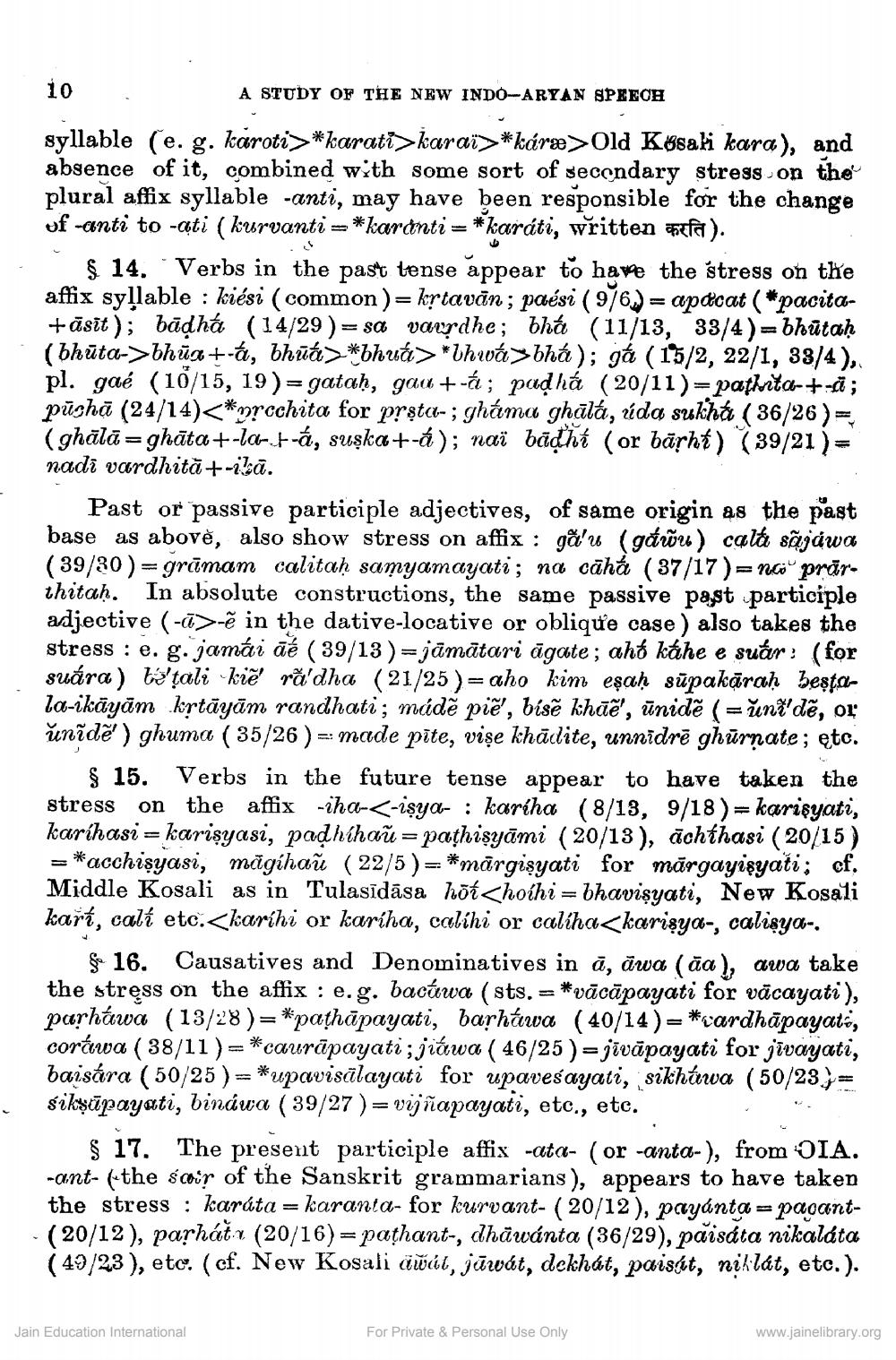________________
10
A STUDY OF THE NEW INDO-ARYAN SPEECH syllable (e. g. karoti> *karati>karaï> *káræ>Old Kasali kara), and absence of it, combined with some sort of secondary stress on the plural affix syllable -anti, may have been responsible for the change of -anti to -ati ( kurvanti = *karanti = *karáti, written asfat).
§ 14. Verbs in the past tense appear to have the stress on the affix syļlable : kiési (common)= krtavān; paési ( 976.) = apæcat ( *pacita+äsit); bāďhá (14/29 )= sa vaurdhe; bhá (11/13, 33/4)=bhūtaḥ (bhūta->bhūg+-á, bhūá> *bhuá> *thwá>bhá); gá (15/2, 22/1, 33/4), pl. gaé (10/15, 19)= gataḥ, gau +-á; pud há (20/11)= pathnta-+-d; pūghā (24/14)<*prcchita for prşta-; gháma ghālá, úda sukhá (36/26 ) = (ghālā=ghāta+-la-. t-á, suşka+-á); naï bāçhi (or bāşht) (39/21 ) = nadi vardhitā +-ikā.
Past or passive participle adjectives, of same origin as the past base as above, also show stress on affix : gă'u (gávu) calá sajáwa (39/30)=grāmam calitaḥ samyamayati; na cāhá (37/17)= ng prorthitaḥ. In absolute constructions, the same passive past participle adjective (-ū>ē in the dative-locative or obliqưe case ) also takes the stress : e. g. jamái āe (39/13)=jāmātari āgate; ahó kahe e suár: (for suára) batali küē rādha (21/25 )= aho kim eşaḥ sūpakāraḥ bestala-ikäyām krtāyām randhati; mádě piē', bisẽ khūë', ünidē (= unt'dē, or inīdē') ghuma ( 35/26 ) =: made pite, vişe khädite, unnidrē ghūrnate ; eto.
$ 15. Verbs in the future tense appear to have taken the stress on the affix -iha-<-isya- : kariha (8/13, 9/18 )= karisyati, karihasi = karisyasi, padhihał = pathisyāmi (20/13), āchthasi (20/15) =*acchişyasi, mūgihaī (22/5)= *märgisyati for mārgayişyati; cf. Middle Kosali as in Tulasīdāsa hõi<hoihi= bhavisyati, New Kosali kart, calí etc.<karihi or kariha, calihi or caliha<karisya-, calisya-.
fe 16. Causatives and Denominatives in ā, āwa (āa), awa take the stress on the affix : e.g. bactwa (sts. - *vācāpayati for vācayati), parháwa (13/28 )= *pathāpayati, barhtiwa (40/14)= *vardhāpayato, coráwa ( 38/11 ) = *caurāpayati ; jiớwa ( 46/25 )=jivāpayati for jīvayati, baisára (50/25 )= *upavisälayati for upaveśayati, sikhówa (50/23 ) = siksupayati, bindwa (39/27 )= vijñapayati, etc., etc.
§ 17. The present participle affix -ata- (or -anta-), from OIA. -ant- (the scour of the Sanskrit grammarians), appears to have taken
the stress : karáta = karanta- for kurvant- (20/12), payánta = paoant- (20/12), parhát» (20/16)= pathant-, dhāwánta (36/29), paisáta nikaláta
(49/23 ), etc. (cf. New Kosali dùil, jūwát, dekhát, paisat, niklát, etc.).
Jain Education International
For Private & Personal Use Only
www.jainelibrary.org




